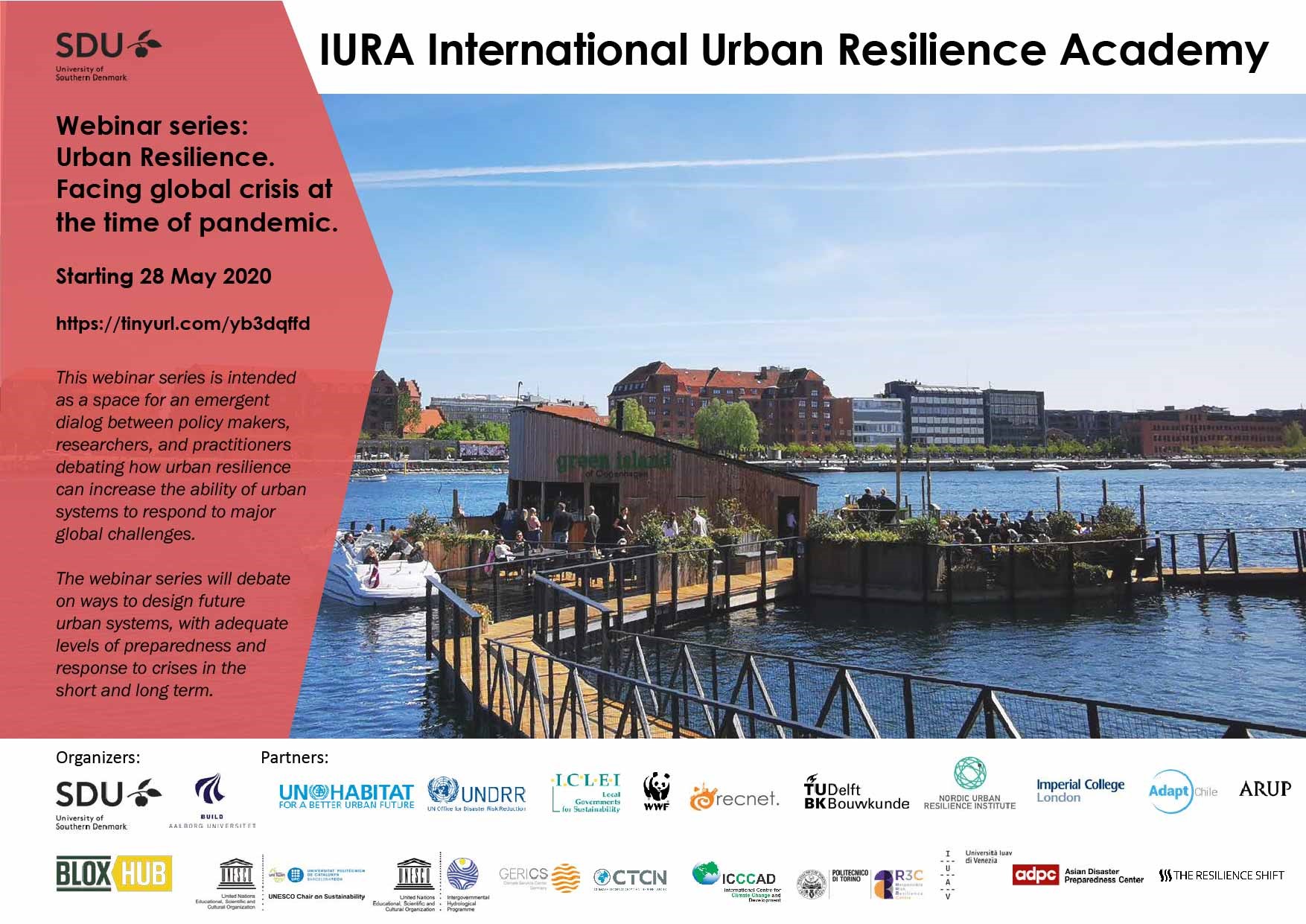This webinar series started on 28th May 2020
Today over 50% of the world population lives in urban areas, and cities account for 60-80% of global energy consumption and the same level of greenhouse gases emissions, consuming 75% of natural resources and producing 80% of global GDP. The Covid-19 pandemic shows us once again that cities and their populations are vulnerable and increasingly exposed to shocks and stresses. Considering the rapid urbanization, projections estimate that 7 out of 10 people living in cities by 2050,and the question becomes how we plan and accommodate this growth while building resilient urban communities, thriving despite growing threats.
The concept of urban resilience takes different nuances and meanings for different stakeholders, and its definition is ever-evolving, accounting for new layers of complexity. This webinar series is intended as a space for an emergent dialogue between policymakers, researchers, and practitioners debating how urban resilience can increase the ability of urban systems to respond to major global. The first webinars of this series will focus on analysing how cities have been affected and responded to thecurrent global pandemic crisis we are experiencing, and what we can learn from this crisis that can be applied, operationally and normatively, for responding to other concurrent global challenges, including climate change, making cities more resilient.
Through interactive lectures and diverse panel discussions, this webinar series will debate ways to design future urban systems, with adequate preparedness and response to crises in the short and long term. Hot topics woven in the series look at how existing international policies in relation to urban resilience account (or not) for a just transition for resilient futures, able to respond to risks posed by climate change and other crises. A spotlight will be cast on the Global South and its particular challenges in this transition.
The panellists, representing leading organizations, will share views related to policy vertical and horizontal integration, participatory processes and engagement, the catalytic role of urban planning, resilient infrastructure, finance mechanisms and innovative partnerships concepts fostering knowledge brokerage for capacity building. Moreover, some of the sessions will be dedicated to developing and implementing tools, frameworks, and practices worldwide, including those developed in the frame of major international organizations and leading private sector organizations and the latest research developments and perspectives.
The webinar series is organized as part of the activities of the International Urban Resilience Academy IURA, coordinated by the University of Southern Denmark in collaboration with: BLOXHUB, Aalborg University - BUILD Department of the Built Environment, The United Nations Human Settlements Programme UN-Habitat, ICLEI – Local Governments for Sustainability, UNESCO Chair on Sustainability at the Polytechnic University of Catalonia UPC, United National Educational, Scientific and Cultural Organization UNESCO - Intergovernmental Hydrological Programme, United Nations Office for Disaster Risk Reduction UNDRR, International Centre for Climate Change and Development ICCCAD, World Wildlife Fund WWF International, Climate Service Center Germany GERICS, Climate Technology Centre and Network CTC-N, IUAV University of Venice, Delft University of Technology TU Delft, Nordic Urban Resilience Institute NURI, Polytechnic University of Turin POLITO - Responsible Risk Resilience Centre R3C, RECNET. Recycling the City Network, Asian Disaster Preparedness Centre ADPC, ARUP, Asociación Adapt-Chile, Imperial College London ICL, The Resilient Shift.
Planned webinars:
#1 WEBINAR (28 MAY 2020, 09:30-11:30 CET): Facing global crisis at time of pandemic: research, practice and policy perspectives.
#2 WEBINAR (1 JUNE 2020, 16:30-18:30 CET): Learning from crisis: resilient leadership and positive transformation.
#3 WEBINAR (4 JUNE 2020, 09:30-11:30 CET): Incremental and radical solutions for critical infrastructures.
#4 WEBINAR (8 JUNE 2020, 16:30-18:30 CET): Just transition facing global crises: social (in)justice and (in)formalities.
#5 WEBINAR (11 JUNE 2020, 09:00-11:00 CET): Tools and methods for making cities sustainable and resilient.
#6 WEBINAR (15 JUNE 2020, 16:30-18:30 CET): Harmonizing multi-level governance: vertical and horizontal integration.
#7 WEBINAR (18 JUNE 2020, 09:30-11:30 CET): Tools and methods for climate action plans and transformative participation.
#8 WEBINAR (22 JUNE 2020, 16:30-18:30 CET): Knowledge brokerage through partnerships and networks.
#9 WEBINAR (25 JUNE 2020, 09:00-11:00 CET): Finance and jobs for just transition.
#10 WEBINAR (26 JUNE 2020, 10:30-11:30 CET): Envisioning the future and enabling paradigm shift.
